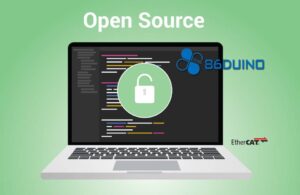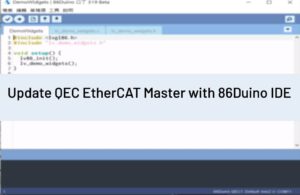[CANBus]
Description
Function to filter CAN ID. On the 86Duino platform, there are 32 groups of CAN ID filters. When receiving data from the CAN bus, these filter ID can be used to determine whether the data need to be handled.
Combining with the init_Mask() function, receiving data can be limited to CAN ID within the A ~ B range.
When this function is used in a sketch without calling the init_Mask() or init)Filt() function first, data from all CAN ID will be accepted.
Syntax
CAN.init_Filt(num, ext, ulData)
Parameters
- num: Identify filter ID to be used, within the 0 ~ 31 range.
ext: data transmission format. There are 4 different options:CAN_STDID: Standard data frame, comply with CAN 2.0A standard. ID range: 0 ~ 0x7FF
CAN_EXTID: Extended data frame, comply with CAN 2.0B standard. ID range: 0 ~ 0x1FFFFFFF
CAN_STDID_REMOTE: Standard remote frame, comply with CAN 2.0A standard. ID range: 0 ~ 0x7FF
CAN_EXTID_REMOTE: Extended remote frame, comply with CAN 2.0B standard. ID range: 0 ~ 0x1FFFFFFF
- ulData: Filter value. Refer to the following example:
Without mask:
0 0 0 0 0 0 1 1 Filter ID value: 0x03
0 0 0 0 0 0 0 0 Mask: 0x00
Range of CAN ID to receive data:: 0x03
With mask
0 0 0 1 1 0 0 1 Filter ID value: 0x19
0 0 0 0 0 0 0 1 Mask: 0x01
Range of CAN ID to receive data:0x18、0x19
0 1 0 1 1 1 0 0 Filter ID value: 0x5C
0 0 0 0 0 1 1 1 Mask: 0x07
Range of CAN ID to receive data:0x58 ~ 0x5FReturns
- CAN_FAIL: Setting failed
- CAN_OK: Setting success
Examples
#include <CANBus.h>
unsigned char buf[8] = {0, 1, 2, 3, 4, 5, 6, 7};
void setup() {
Serial.begin(115200);
CAN.begin(CAN_500KBPS); // Configure CAN bus transmission speed to 500KBPS
CAN.init_Filt(0, CAN_STDID, 0x019); // Configure filter ID 0 to 0x019, using Standard data frame
CAN.init_Mask(0, CAN_STDID, 0x01); // Configure mask for filter ID 0 to 0x01, using standard data frame
}
void loop() {
CAN.beginTransmission(0x00, CAN_STDID); // Set external CAN ID to 0x00, using standard data frame
CAN.write(buf, 8); // Transmit 8 bytes of data
CAN.endTransmission(); // End transmission
delay(10);
}See also
Libraries Reference Home
The text of the 86Duino reference is a modification of the Arduino reference and is licensed under a Creative Commons Attribution-ShareAlike 3.0 License. Code samples in the reference are released into the public domain.



